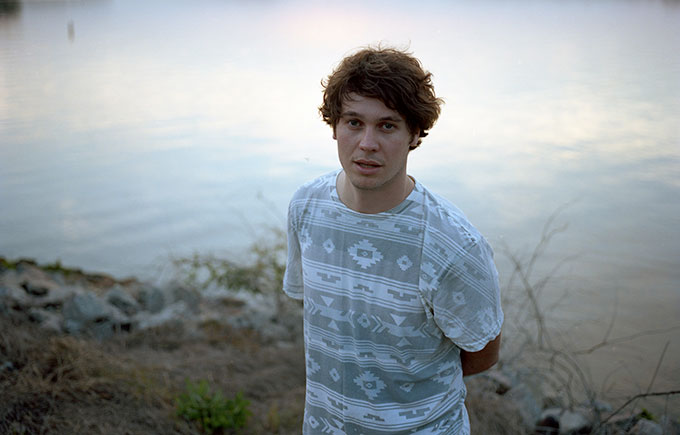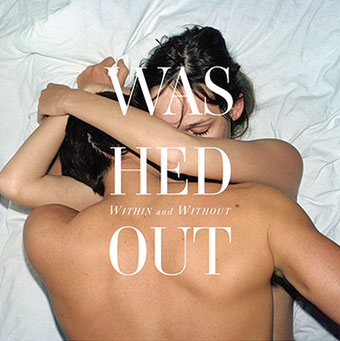Washed Out
by Cory Perla


Chillwave producer Ernest Green talks about dropping samples in favor of live instruments
Most musicians like to stick to one writing process for a career. Not Washed Out. The 29-year-old chillwave producer originally began making music as a bedroom mixer, using samples as his primary source of sound on EPs like High Times and Life of Leisure, but upon production of his debut full-length album he made a complete 180-degree turn toward organic instrumentation. A risky move for a young producer who’s prevous material hinged on samples, but it was a move that paid off: That album, Within and Without, has received plenty of critical acclaim, being named “Best New Music” by Pitchfork and earning high ratings from Spin and the Guardian.
Next week Washed Out will join Cut Copy—an Austrialian electronica band formed in 2001, currently on tour in support of their latest album Zonoscope—on a US tour that lands both electronic acts in Buffalo at the Town Ballroom on Thursday, September 15. This week I talked to Washed Out, real name Ernest Greene, about his debut album, and why he made the switch from sampling to live instruments.
Artvoice: You’re doing a bunch of dates with Cut Copy. What will your live set up be like?
Ernest Greene: I have a band playing with me now. It’s a five-piece, including me. When I started off I was playing shows by myself so everything was very sequenced out on the computer. Since then I’ve been through a couple of lineups with the band, but now everything is not quite as sequenced as it was before. We’re no jam band, by any means, but there are portions of the set that can go various ways depending on the night. It makes it a lot more fun for us. It sounds much better and there is way more energy having more bodies on stage. It was definitely something I was thinking about quite a bit [during the production of Within and Without]; the album is much more organic than my previous work, which was written when there was no audience at all, so I never thought of performing. At the same time, I don’t want to limit myself in anyway, but I’m definitely using a lot more organic sounds; live drums, bass, guitar.
AV: Did you run into any challenges writing your music in that way?
Greene: The biggest challenge I ran into was not having written a full-length album before. It was a bit intimidating and I knew that I didn’t want a mere collection of random songs. I wanted everything to really seem like one big picture. So it was something I struggled with a lot and I had to develop a core palette of sounds to use to make everything make sense across 40 minutes. It is a lot different than the albums I’ve done before. I’m just constantly changing, listening to new music, learning new things as a producer. I want that to kind of show up on the records. I also like the idea that the songs are like diaries of where I’m at, at that moment.
AV: Why do you think Ben Allen—who produced Animal Collective’s last album, Merriweather Post Pavillion, among other things—was a good choice as producer for this record?
Greene: I’m definitely a fan of his stuff, that Animal Collective record in particular—but at the time I didn’t really have any network for reaching out to producers so he was the one and only name on my list. I feel very lucky that we had a connection. I live in Atlanta now and I had just moved before we started work at his studio here. It was a great process.
AV: You’re originally from the South?
Greene: I’m originally from a town that is about an hour and a half south of here. Perry, Georgia.
AV: That is surprising because your music has a really European feel. How does living in southern America affect your music?
Greene: I never thought of myself as really rebellious, but I think a lot of the music I was exploring was a reaction against the music that is big around here, like southern rock. I was just constantly trying to make music that was different.
AV: You certainly do make music that is different, and a lot of people, including myself, have used the term “chillwave” to describe it. What is your reaction to that term?
Greene: I’m okay with the term. I realize that the record is going to be classified in some way. When I hear chillwave I think of certainly some electronic influences, but also some other influences as well; pop structured songs, for sure. I think this record fits into that. I prefer something like dream-pop, though. The music at its core is pop music and the vocals have a sort dreamy quality. I don’t really care what people call it though as long as they’re into it.
AV: What influences you? I feel like I hear a little bit of the Magnetic Fields in there. They seem to be a kind of precursor to chillwave.
Greene: Yeah, definitely, I’ve loved a lot of his records. I started off doing a lot of sampling stuff, which was more of a hip-hop based thing, and DJ Shadow was of course an early influence. As I got older and the music started to evolve, it became less hip-hop oriented and I brought in some dance elements like the four to the floor beat. There were a handful of more obvious dance influences, especially from the early 1980s, synth-pop stuff. A lot of hip-hop samples a certain era of 1970s funk, but I eventually got tired of that sound and got much more into 1970s disco, which has a lot more analogue synthesizer sounds. I got kind of obsessed with those analogue sounds for a while, which really shaped what I’ve been doing with Washed Out.
AV: For your song “Feel It All Around,” off of the Life of Leisure EP, you sampled an italo disco track called “I Want You,” which is a fairly obscure track. How did you decide to sample that song?
Greene: At the time I was spending a lot of time on the internet looking for samples. On eBay it is really easy to find rare MP3s because there is this sub-culture of vinyl collectors who upload a lot of limited edition and rare stuff. I was downloading tons of stuff and I had never heard that track before. It was actually a hit in Europe and Italy in the early 1980s, but I was just thinking of it as a really good, kind of cheesy disco song. I pitched it down—which you can’t really do with every song, but this song was recorded in such a way that the bass wasn’t too low pitched and it was really trebly, so slowed down it had this really cool quality about it. The hardest thing for me was trying to put together an interesting arrangement that changes. It is easy to get an interesting loop to happen, but it becomes a collage when the song and loop are constantly changing. It is a very time consuming process to find the right piece to the puzzle and that is what kind of drove me away from sampling. It made more sense to me to just sit down at a keyboard and play the stuff instead of looking for the right piece.
AV: “Feel It All Around” has been used as the theme song to the new IFC television series, Portlandia. How does it feel to hear your music used in such a way?
Greene: It is really exciting. There is a short little credit at the end that mentions Washed Out. It was a very positive experience. I never thought twice about giving over the track, I’m definitely a fan of Fred Armisen. I feel like after every episode I talk to people who discovered Washed Out through hearing it on the show.
blog comments powered by Disqus|
Issue Navigation> Issue Index > v10n36 (Week of Thursday, September 8) > Washed Out This Week's Issue • Artvoice Daily • Artvoice TV • Events Calendar • Classifieds |









 Current Issue
Current Issue